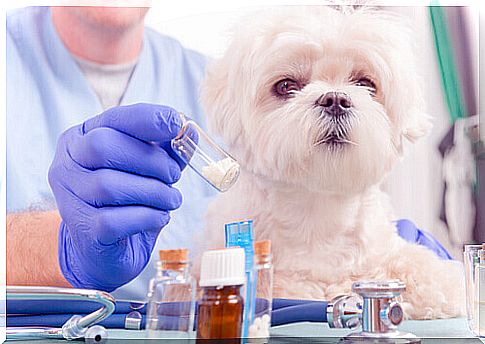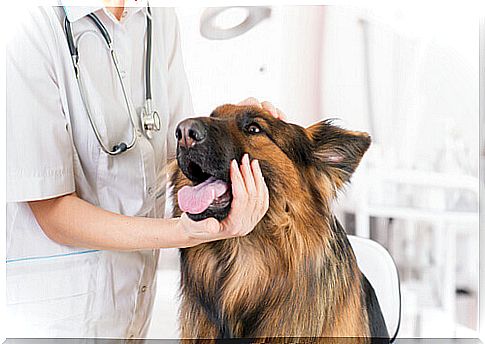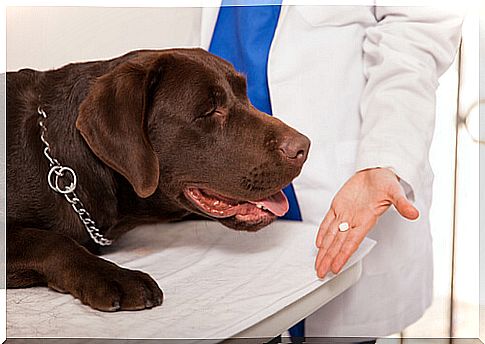Ibuprofen And Dogs: A Combination To Avoid

A serious mistake that is made very often is giving animals drugs for humans. This is the case with analgesics and antipyretics. Their bodies are different and without proper medical prescription they are highly dangerous. Among these, and in particular, is ibuprofen. Below we give you information on the toxicity of ibuprofen for dogs.
Ibuprofen: why is it a risk?
Who does not have painkillers in their medicine cabinet and has taken them when they feel unwell? It is a widespread practice among humans and which does not present great risks. However, the same procedure with animals can be highly harmful. It can even cause the animal to die.
These are products whose composition is designed for the human body. Even in low doses, in fact, it can cause serious problems for dogs.

The toxicity of ibuprofen in dogs is demonstrated. Giving such a drug to the animal is a serious mistake that can cause great sorrow. It is also a very common mistake. Because it is close at hand, because it is a cheaper drug than that for animals or because you want to save money on the vet visit, whatever the reason, its administration to dogs is very extensive.
Ibuprofen and dogs: what to know about its toxicity
Unfortunately, intoxication from this drug, together with that from acetaminophen and aspirin, represents one of the most common poisonings. It is estimated that one in three people give it to their pet.
The animal organism is very different from that of the human being, as is the way it assimilates the drug. There are certain enzymes in the body that attack drugs. In animals, these enzymes are different, as are the way in which drug substances are eliminated. This causes many of these substances to remain in the dog’s body and, as a result, lead to intoxication.
What happens then? The animal’s body is not prepared to receive and process these drugs and its body does not eliminate toxic substances. This explains why ibuprofen is toxic to dogs.
What problems does it cause to the dog’s body?
The toxicity of these compounds inhibits substances that protect the dog’s intestinal walls and blood circulation in the kidneys. For this reason, the main consequences fall on these two organs.
Anything that is retained by the dog’s body accumulates, in the liver or kidneys. Over time, bleeding, kidney failure and even death of the animal can occur
Is there a risk-free dose?
Ibuprofen is always, regardless of the dose administered, toxic to dogs.
This drug has an insignificant margin of safety among dogs. Half a tablet, for example, given to a 50 kg dog represents a risk and there is the possibility that it will be toxic. Gastric ulcers, kidney or heart problems may occur. There is also a risk of changes in the nervous system, such as seizures or coma.
The consequences depend on the size of the dog and sometimes a single intake is lethal for the smallest specimens.
Some drugs are allowed
Although some doctors prescribe paracetamol in very low doses, a veterinary visit must still be made first.
The Italian Medicines Agency establishes the human medicines that can be administered to dogs with the due prescription. Ibuprofen is not among those allowed.
The problem is that none of them contain indications regarding the adequate administration to animals and it is a mistake to consider that the dose indicated for children also applies to our four-legged friends.
Symptoms in case of ibuprofen intoxication
If the animal has ingested ibuprofen, the following symptoms indicate possible intoxication:
- Weakness,
- Drowsiness,
- Nausea and vomit,
- Colic,
- Diarrhea,
- Dark stools,
- Kidney failure.

Advice
We conclude by giving you some tips that are useful in these cases:
- Never give animals medicines for human use, even if they may seem insignificant doses.
- Remove the pouches or medication box from the dog’s reach.
- In the presence of any ailment, consult a veterinarian. The expert will indicate the drugs suitable for the animal, the appropriate doses and the time of administration. If you are a trusted professional, even a phone call may be enough.
- In the presence of any of the symptoms mentioned, it is necessary to go urgently to the veterinarian to take the necessary measures.









